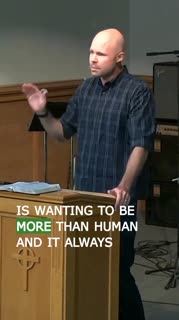Overcoming Pride: Lessons from Nebuchadnezzar's Fall
Devotional
Sermon Summary
Bible Study Guide
Sermon Clips
1) "We've seen a few things so far But today in chapter 4 What we're going to see Is that living in exile It means dealing with pride You know pride around us But also pride inside of us You know it's easy to see I think if you've been with us The pride of Babylon so far There's a lot of pomp and circumstance Nebuchadnezzar and his perspective on the world And life and the Chaldeans And so on and so forth You know it's probably easy for you To look around Los Angeles And see pride at work in various places You know but it's It's harder to see pride in ourselves." [44:47] (34 seconds)
2) "The heart of pride is saying My kingdom come not your kingdom come My will be done not your will be done Pride is living Not knowing that God rules the kingdoms of men And gives it to whom he will It is saying I build my own kingdom I rule over my own life Nothing shall be higher than me In the decisions I make, the life I live The way I conduct myself And this is the heart of pride Louis Smedes is an old author He said pride is the refusal to let God be God It is to grab God's status For oneself." [57:25] (32 seconds)
3) "Pride is puffing yourself up in God's face Turning down his invitation To join the dance of life As a creature And wishing instead to be the creator Independent Reliant on your own resources Pride is the grand illusion The fantasy of fantasies The cosmic put on That is the heart of pride My kingdom come not your kingdom come My will be done When you misunderstand pride For modern people we tend to think That pride Is what happens when somebody thinks That they are better at something than they really are And not stop talking about it." [57:59] (37 seconds)
4) "Pride always says, I did it and I deserve it. Look at this great kingdom that I've built. Pride makes you look at all of your life that way. Look at this great thing that I've built. Everything is something you control, you earned, you did, that you're owed. One pastor said, pride is cosmic plagiarism. I mean, imagine every song you heard on the radio that you liked. You immediately said, well, I'm going to go learn that and then tell people I wrote it. You pass it off as your own." [01:02:04] (28 seconds)
5) "Pride is wanting to be more than human and it always makes you less than human and the more it goes to work in your life the more it will make you animalistic now C.S. Lewis talked about pride he said pride is spiritual cancer it eats up the very possibility of love or contentment or even common sense love contentment common sense you know those are three things that are uniquely human animals don't have common sense they don't have contentment and they don't love and Lewis is saying pride is like a cancer it eats up the human in you until all of it's gone and you're left with nothing but animalistic tendencies." [01:09:15] (37 seconds)
6) "The nature of pride is it's never ending because for all of its bravado, all pride covers up a massive emptiness inside of us that never actually gets filled. You know, look at Nebuchadnezzar's statement. It would be perfectly easy for him to say, what an amazing place Babylon is. I'm so glad I have the chance to enjoy this and participate in it in certain ways. What a gift. It'd be so easy for him to say that but he doesn't. He can't. He has to force himself into the middle of everything." [01:03:32] (34 seconds)
7) "The relentless focus on yourself means you are constantly looking down and looking in you're constantly assessing whether your ego is getting the respect it deserves whether you are slotting yourself into life as a worthwhile person the way you think you should you're constantly looking down and as you look down C.S. Lewis said you can't see God and your self begins to fill your entire field of vision your ego becomes like a lunar eclipse and it begins to block out the sun so that you can't see any of the light." [01:18:01] (36 seconds)
8) "You notice in this whole story God isn't actually paying Nebuchadnezzar back for his pride he's bringing him back he's inviting him back this isn't punishment for Nebuchadnezzar to endure it's surgery to cure him and God wants the same thing for you and for me he wants to rescue us from our own pride to make us really human again and so let's end in the most Brian Coleman way possible I'm going to give you a long C.S. Lewis quote you knew it was coming now here it is he wrote a lot on pride it's very good." [01:23:25] (31 seconds)
Ask a question about this sermon
2) "The heart of pride is saying My kingdom come not your kingdom come My will be done not your will be done Pride is living Not knowing that God rules the kingdoms of men And gives it to whom he will It is saying I build my own kingdom I rule over my own life Nothing shall be higher than me In the decisions I make, the life I live The way I conduct myself And this is the heart of pride Louis Smedes is an old author He said pride is the refusal to let God be God It is to grab God's status For oneself." [57:25] (32 seconds)
3) "Pride is puffing yourself up in God's face Turning down his invitation To join the dance of life As a creature And wishing instead to be the creator Independent Reliant on your own resources Pride is the grand illusion The fantasy of fantasies The cosmic put on That is the heart of pride My kingdom come not your kingdom come My will be done When you misunderstand pride For modern people we tend to think That pride Is what happens when somebody thinks That they are better at something than they really are And not stop talking about it." [57:59] (37 seconds)
4) "Pride always says, I did it and I deserve it. Look at this great kingdom that I've built. Pride makes you look at all of your life that way. Look at this great thing that I've built. Everything is something you control, you earned, you did, that you're owed. One pastor said, pride is cosmic plagiarism. I mean, imagine every song you heard on the radio that you liked. You immediately said, well, I'm going to go learn that and then tell people I wrote it. You pass it off as your own." [01:02:04] (28 seconds)
5) "Pride is wanting to be more than human and it always makes you less than human and the more it goes to work in your life the more it will make you animalistic now C.S. Lewis talked about pride he said pride is spiritual cancer it eats up the very possibility of love or contentment or even common sense love contentment common sense you know those are three things that are uniquely human animals don't have common sense they don't have contentment and they don't love and Lewis is saying pride is like a cancer it eats up the human in you until all of it's gone and you're left with nothing but animalistic tendencies." [01:09:15] (37 seconds)
6) "The nature of pride is it's never ending because for all of its bravado, all pride covers up a massive emptiness inside of us that never actually gets filled. You know, look at Nebuchadnezzar's statement. It would be perfectly easy for him to say, what an amazing place Babylon is. I'm so glad I have the chance to enjoy this and participate in it in certain ways. What a gift. It'd be so easy for him to say that but he doesn't. He can't. He has to force himself into the middle of everything." [01:03:32] (34 seconds)
7) "The relentless focus on yourself means you are constantly looking down and looking in you're constantly assessing whether your ego is getting the respect it deserves whether you are slotting yourself into life as a worthwhile person the way you think you should you're constantly looking down and as you look down C.S. Lewis said you can't see God and your self begins to fill your entire field of vision your ego becomes like a lunar eclipse and it begins to block out the sun so that you can't see any of the light." [01:18:01] (36 seconds)
8) "You notice in this whole story God isn't actually paying Nebuchadnezzar back for his pride he's bringing him back he's inviting him back this isn't punishment for Nebuchadnezzar to endure it's surgery to cure him and God wants the same thing for you and for me he wants to rescue us from our own pride to make us really human again and so let's end in the most Brian Coleman way possible I'm going to give you a long C.S. Lewis quote you knew it was coming now here it is he wrote a lot on pride it's very good." [01:23:25] (31 seconds)








